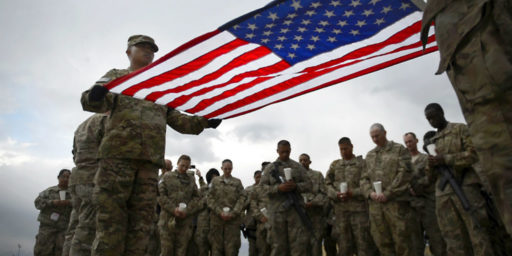Koran Burnings By U.S. Military Cause Protests In Afghanistan
The head of U.S. forces in Afghanistan is dealing with a rather sensitive public relations problem now that it’s been acknowledged that U.S. forces burned several copies of the Koran at a prison facility:
BAGRAM, Afghanistan —Deeply angered over reports that U.S. troops had mistakenly burned copies of the Koran, Islam’s holy text, thousands of protesters on Tuesday tried to storm the largest U.S. base in Afghanistan.
The protests erupted early in the morning, after Afghans working inside Bagram air base told local residents that a number of copies of the Koran had been burned. The incident prompted the top U.S. military officer in Afghanistan, Gen. John R. Allen, to offer a public apology and order an investigation.
“When we learned of these actions, we immediately intervened and stopped them,” Allen said in a statement. “We are taking steps to ensure this does not ever happen again. I assure you … I promise you … this was NOT intentional in any way.”
In Washington, White House spokesman Jay Carney echoed Allen’s statement, saying: “We apologize to the Afghan people and disapprove of such conduct in the strongest possible terms. This deeply unfortunate incident does not reflect the great respect our military has for the Afghan people. It’s regrettable.”
Allen later said he had ordered all NATO forces in Afghanistan to complete training in the proper handling of religious materials by March 3. NATO said the order was issued after an incident Sunday night when religious materials, including Korans “identified for disposal,” were collected at the Parwan Detention Facility, a prison next to the air base, and “were inadvertently taken to an incineration facility at Bagram airfield.”
In front of the main entrance to the base, protesters hurled rocks, flung burning tires and broke the windows of nearby buildings. Many of the protesters said they have jobs at the base, which employs about 5,000 local residents. On Tuesday, feeling betrayed, they chanted “long live Islam” and “death to America.”
U.S. officials said that the copies of the Koran were mistakenly included in a bundle of material bound for an incinerator on the base. The books were quickly removed once Afghan employees told American soldiers that burning them would be deeply sacrilegious.
But that intervention happened only after the pages of some books were charred. Afghan employees of the base carried those remains outside the Bagram’s front gate as evidence of what had happened, galvanizing a growing crowd of protesters.
“The people who do this are our enemies,” said a 27-year-old who has worked at a warehouse on the base for two years. “How could I ever work for them again?”
Another Bagram employee who joined the protest said, “Whoever goes back to work will be killed. They’ll think of us as traitors.”
The books were handed to local parliamentarians and religious officials,who took them to the Interior Ministry in Kabul, where officials said they will be held as evidence.
“If the Americans ever deny that they did this, we will show them these pages,” said Mullah Abdul Rahim Shah Agha, head of Parwan province’s ulema council, or Muslim clerical body, as he held one of the partially burned Korans.
Qari Ghulam Mustafa, another member of the council, held a stack of 10 Korans on his lap during the car trip to Kabul. He said nearly 100 more books were damaged.
“These people must be punished,” he said.
Another report indicates that the Korans in question, along with other material, were confiscated because they had been inscribed with “extremist” messages and may been used to facilitate communications between those in the prison and people on the outside. Whatever the case, though, and despite the fact that it appears pretty clear that the books were burnt by mistake, this is an unnecessary headache for American commanders in a country where the situation is already volatile.






This is just a first impression, but wouldn’t that job require a soldier or staff member with high security clearance because of handling these materials? I’m not jumping on anything yet, but it just seems odd to me.
Does anyone know how are damaged Korans supposed to be disposed of? Is there some sort of religious ceremony involved?
@Stormy Dragon:
Ask and ye shall receive:
http://www.csmonitor.com/World/Global-News/2012/0221/Quran-burning-What-is-the-respectful-way-to-dispose-of-Islam-s-holy-book
Note that you can dispose of a Koran by burning it, just as with the American flag or even a body. It’s the facts that surround the burning that make all the difference.
To me (and I’m no super destroyer) this is something that is fundamentally different between a modern western country and a modern Islamic state: this belief that the state, and failing that, the individual, must enforce orthodoxy up to the point of murder. Only fringe and backward Christian, Jewish or non-religious states (ex: Serbia in the 80’s) react this way to perceived threats to their belief system. But even thoroughly modern Islamic countries such as Indonesia or Turkey can be driven to paroxysms of destruction by a perceived slight to their orthodoxy. I don’t see how we are going to get past that.
@MarkedMan: It shows how brain washed they really are and how religion is just plain nuts. It`s a effing book stop the nonsense.
Same sentiments here: It’s a freaking book. What they heck does it say about the people when accidentally burning a book is enough to incite a murderous frenzy.